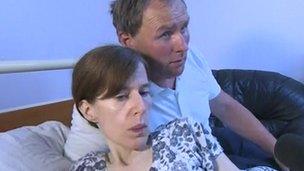Housing benefit challenge cases
- Published

Charlotte and Jayson Carmichael say they need a second bedroom due to her spina bifida
A group of 10 disabled people have lost a legal challenge to government plans to cut housing benefit.
They are from various parts of the UK including London, Stoke on Trent, Manchester and Birmingham, and say they are being badly affected by the benefit changes.
Here are their arguments.
Case one: need for three bedrooms
Lawyers for one London family say they live in a damp, one-bedroom flat infested with mice. One son has autism; the other has Down's Syndrome.
The child with autism sleeps in the bedroom while his mother, father and brother sleep on the floor in the living room.
Owing to the changes, they say they cannot afford to move to the three-bedroom property which they have been assessed as requiring.
Case two: no space for second bed
Charlotte Carmichael has spina bifida and sleeps in a fixed position in a hospital-style bed which, she argues, her husband Jayson - who is her full-time carer - cannot share.
He sleeps in their spare room as there is not enough space in her room for a second bed.
Case three: needs three bedrooms
In 2011, a six-year-old boy was assaulted by the then partner of his mother, leaving him traumatised.
Now aged nine, he and his four-year-old sister live with their mother in a three bedroom property because, solicitors say, of his behavioural and mental issues - including a risk of violence to his sister.
His mother was told she would lose £15.52 a week when the council judged they were under-occupying.
Case four: no suitable alternatives
A wheelchair user lives in a three-bedroom bungalow shared with his stepdaughter, who stays in university accommodation during the week in term-time.
She also uses a wheelchair, as she has a rare form of muscular dystrophy. He says he needs a third bedroom to store equipment, including a hoist for lifting him.
He has had his housing benefit cut by 25% but contends there are no suitable two-bedroom homes in the social sector.
Case five: paper-filled rooms
For 19 years a single man with mental health problems, including Obsessive Compulsive Disorder, has lived in a high-rise tower block with three bedrooms.
He claims he does not sleep in any of the rooms as they are filled with papers he has accumulated - as is his bath.
He receives medication for depression and has psychological treatment in hospital. He claims that he is very anxious about having to move and disrupt his routines.
Case six: 24-hour support
A 26-year-old woman with the mental age of three needs support with every aspect of her life and 24-hour care. She has lived with her mother in a specially adapted three-bedroom property for 20 years.
The property is fitted with a lift, a gradual slope at the front and rear for wheelchair access, ceiling hoists and a changing bed. The mother is to receive discretionary housing payments until September, after which her housing benefit will be cut by 14%. She has appealed against the decision.
Case seven: risk of physical harm
The parents of a severely autistic 10-year-old boy with complex neurodevelopmental difficulties say that he cannot share a bedroom with his 12-year-old brother.
They argue their younger son is strong and violent, and that sharing a room would increase the risk of physical harm to their elder son.
The family live in a three-bedroom bungalow and were handed a 14% cut in their housing benefit cut before appealing against the decision. The local authority has now granted them an extra bedroom allowance.
Case eight: garden to play safely
A single mother was made homeless with her two children, an eight-year-old boy and five-year-old girl, when she fled her violent partner in 2010.
They now occupy a three-bedroom ground floor flat with a garden. The property was allocated on the basis that the boy's disabilities, which include autism and ADHD, have led to problems affecting his interaction with other children and playing safely in public spaces.
The mother has been told they will face a 14% cut in their benefit, though it has yet to take effect as a decision on her appeal has not yet been reached.
Case nine: parents sharing care
The father of a nine-year-old boy, who suffers from spastic quadriplegia and cerebral palsy, shares the care for his son with his mother, whom he separated from when the boy was 18-months old.
The son spends every weekend and at least one day during the week with his father.
The boy is a full-time wheelchair user who moves around inside their two-bedroom flat by shuffling around on his bottom. The father has been informed that his housing benefit will be cut by 14%.
Case ten: medical priority
A couple with a six-year-old son, who suffers from a rare brain disorder, and a two-year-old daughter, live in a two-bedroom property.
Though aged six, their son is still in nappies, cannot walk and cannot look after himself. He can crawl and will eventually progress to a wheelchair, they say.
His parents argue that he needs his own bedroom for all his equipment, for his personal care, and for the risk he poses to his younger sister.
They have been given medical priority by their local authority to move to a three-bedroom property, though they presently live in accommodation too small for their needs.